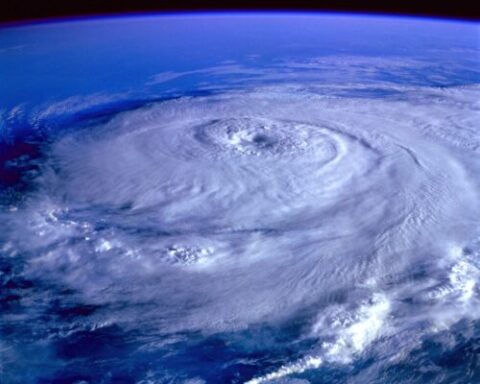The following resource is an excerpt from the complete Climate and Church resource, a product of the National Council of Churches Eco-Justice Program – now Creation Justice Ministries.
 Though many understand the devastating impacts that climate change will have on human communities around the world, few understand the impacts that climate change will have on core church ministries such as refugee resettlement, feeding the hungry, and disaster relief. The impact of global climate change is already calling on the church to provide more financial resources and volunteer services to meet the growing needs of people in poverty in the U.S. and around the globe.
Though many understand the devastating impacts that climate change will have on human communities around the world, few understand the impacts that climate change will have on core church ministries such as refugee resettlement, feeding the hungry, and disaster relief. The impact of global climate change is already calling on the church to provide more financial resources and volunteer services to meet the growing needs of people in poverty in the U.S. and around the globe.
While ultimate ownership of creation is God’s, we have a responsibility to care for all of God’s creation – both human and nonhuman. And as God’s people, we have a responsibility to work for justice and protect the “least of these,” those communities that are in need.
The impacts of global climate change threaten all of God’s creation and will make it more difficult for people of faith to care for those in need. The increase in greenhouse gas emissions is warming the Earth to dangerous levels and will continue to result in increased drought, storm intensity, disease, species extinction, and flooding. [1] These impacts will increase the lack of food, shelter, and water available, particularly to those living in or near poverty. Although global climate change will affect all human populations across the globe, it will hit those living in poverty the hardest because they depend on the surrounding physical environment to supply their needs and have limited ability to cope with climate variability and extremes. Global climate change will reduce access to drinking water, limited access to food, and negatively impact human health particularly in countries such as Africa, Asia, and Latin America.
___________________________________________
The impact of global climate change is already calling on the church to provide more financial resources and volunteer services to meet the growing needs of people in poverty in the U.S. and around the globe.
___________________________________________
Churches, acting as the body and heart of Christ, remain firm in their dedication to feed the hungry, house the homeless, welcome the stranger, eradicate poverty, and rescue those in crisis. As evidenced in the Gulf Coast after Hurricane Katrina, the Church rises to the challenges of the day and provides great service and comfort to those in need. However, global climate change, because of its sweeping and devastating impacts, challenges the Church as never before. Christians are called to help those in need, which will increase to unprecedented numbers as a result of global climate change.
In many ways, the impending crisis of global climate change represents a moral failure on our part as stewards of God’s creation and harbingers of justice. The United States, and other industrialized nations contribute more carbon emissions than their developing neighbors. [2] And, developing countries will more acutely fee the impacts of our carbon emissions. Our responsibility as Christians, to be good stewards of God’s creation and to work for justice, means that we must address global climate change with a determined heart, mind, and voice.
Refugee Resettlement
 The faith community in the U.S. has historically responded to people fleeing and becoming refugees by working to ensure that those arriving in the United States have the financial resources to resettle here and support their families. Because of a predicted rise in famine, natural disasters, sea levels, catastrophic flooding, and expanding deserts as a result of global climate change, refugee resettlement in the United States is projected to increase over the years. [3] Church communities, therefore, will be called upon to provide for settling refugees in greater measure.
The faith community in the U.S. has historically responded to people fleeing and becoming refugees by working to ensure that those arriving in the United States have the financial resources to resettle here and support their families. Because of a predicted rise in famine, natural disasters, sea levels, catastrophic flooding, and expanding deserts as a result of global climate change, refugee resettlement in the United States is projected to increase over the years. [3] Church communities, therefore, will be called upon to provide for settling refugees in greater measure.
In order to maintain their current level of assistance, as global climate change increases the number of refugees, faith-based organizations and churches will need to dramatically increase their support to help refugees coming to the U.S. As followers of Christ, we are called to care for those who wish to make a new home, as we are all strangers in this world (1 Peter 2:11). However, working to address global climate change sooner rather than later will protect our brothers and sisters around the globe by reducing the need for them to be displaced from their homes and their cultures because of environmental crises.
Climate Change, Hunger, and Agriculture

Jesus commands us to care for those who are the “least of these” – the hungry, the thirsty, the poor, and the vulnerable. Yet, the world is filled with people who go to bed hungry and spend their days in thirst. Unfortunately, global climate change will exacerbate the issues of hunger and lack of access to water. Food production will be affected by rainfall, flood, drought, and changing temperatures. [4] Access to water resources will also be impacted by global climate change. Food and water shortages will hit people in poverty, especially those in least developed countries, the hardest.
The Church has a long history of providing food, clothing, and shelter to those in developing countries. One of the primary areas of focus is food security, ensuring that people have a way to obtain the calories they need everyday. Through crop development and financial support many denominations and faith-based organizations provide food security for hundreds of thousands of people around the world.
Global Climate Change and Disaster Relief

Photo Credit: Barry Carlin
Millions of individuals around the world live in coastal areas that are threatened by an increase in storm intensity. In the U.S., many communities along the coast are living in poverty, forced to live on marginal flood plain lands because of cheaper real estate. These individuals and families with limited income are less equipped to evacuate when storms approach and are at a substantial disadvantage financially during recovery and rebuilding efforts. Few people can forget the devastating images of more than 20,000 people stranded in the city of New Orleans in the aftermath of Hurricane Katrina in 2005.
As witness during Hurricanes Katrina and Rita, the faith community continues to serve as first responders to those impacted by disasters, providing essential food, water, and shelter to individuals who cannot fend for themselves. With an expected rise in severe hurricanes, the faith community will be asked to provide a greater amount of disaster relief, not just in terms of financial resources, but also in terms of human services such as temporary shelter, meals, volunteers for home and church repairs, counseling, and medical care.
If, over the next 30 years, as the current trend indicates, more than half of hurricanes are category 4 and 5, to maintain the same level of financial support, the faith community will need to increase funding for relief and development by more than 42 percent. It is evident that the cost and damages caused by hurricanes will only increase, calling on the faith community to provide more support to congregations and communities in need.
Responding to Global Climate Change
Global climate change clearly impacts all of God’s creation. Although human communities around the globe feel the effects of global climate change, least developed nations and people living in poverty disproportionately feel the impacts. The church community strives to especially serve these communities through ministries such as food assistance, disaster relief, and refugee resettlement. These church ministries will continue to keenly feel the impacts of global climate change and people of faith serving these communities will be looked upon to provide more financial assistance and volunteer services to those in need.
 The reality of this growing crisis calls for the church to be not just reactive in its response to global climate change but to prescribe to the world a need to reduce carbon emissions in order to prevent the catastrophic impacts of global climate change. Global climate change’s impacts are already being felt and will continue to be felt, requiring the church and the larger global community to help impoverished communities adapt to the changes. However, these impacts can be lessened by reducing global carbon emissions globally and in our own communities. Churches can help mitigate carbon emissions by reducing their own carbon footprint and insist that businesses and governments do the same.
The reality of this growing crisis calls for the church to be not just reactive in its response to global climate change but to prescribe to the world a need to reduce carbon emissions in order to prevent the catastrophic impacts of global climate change. Global climate change’s impacts are already being felt and will continue to be felt, requiring the church and the larger global community to help impoverished communities adapt to the changes. However, these impacts can be lessened by reducing global carbon emissions globally and in our own communities. Churches can help mitigate carbon emissions by reducing their own carbon footprint and insist that businesses and governments do the same.
Christians are indeed called to respond to those in need. As Christians, we are also called to protect God’s creation from harm and to work towards a just and sustainable world. Addressing global climate change in our own churches, communities, and nation will bring about the justice and protection of God’s creation that we seek.
___________________________________________
[1] IPCC, 2007: Summary for Policymakers. In: Climate Change 2007: Impacts, Adaptation and Vulnerability. Contribution of Working Group II to the Fourth Assessment Report of the Intergovernmental Panel on Climate Change, M.L. Parry, O.F. Canziani, J.P. Palutikof, P.J. van der Linden and C.E. Hanson, Eds., Cambridge University Press, Cambridge, UK, 7-22.
[2] World Resources Institute How US State Greenhouse Gas Emissions Compare Internationally; available from http://www.wri.org/stories/2006/10/how-u-s-state-ghg-emissions-compare-internationally; accessed December 2, 2007.
[3] Environmental Refugees to top 50 million in 5 years; 2005; available from http://news.mongabay.com/2005/1011-unu.html Accessed on August 1, 2007.
[4] IPCC, 2007: Summary for Policymakers. In: Climate Change 2007: Impacts, Adaptation and Vulnerability. Contribution of Working Group II to the Fourth Assessment Report of the Intergovernmental Panel on Climate Change, M.L. Parry, O.F. Canziani, J.P. Palutikof, P.J. van der Linden and C.E. Hanson, Eds., Cambridge University Press, Cambridge, UK, 7-22.
 ABOUT THIS RESOURCE: For the complete resource with facts and figures, please visit www.creationjustice.org/educational-resources.html This resource was written by Tyler Edgar and Lee Xu, former colleagues at the National Council of Churches Eco-Justice Program, which is now Creation Justice Ministries (CJM). CJM represents 38 Christian denominations and their policies related to the environment.
ABOUT THIS RESOURCE: For the complete resource with facts and figures, please visit www.creationjustice.org/educational-resources.html This resource was written by Tyler Edgar and Lee Xu, former colleagues at the National Council of Churches Eco-Justice Program, which is now Creation Justice Ministries (CJM). CJM represents 38 Christian denominations and their policies related to the environment.
Read more articles in this series!





Unbound Social